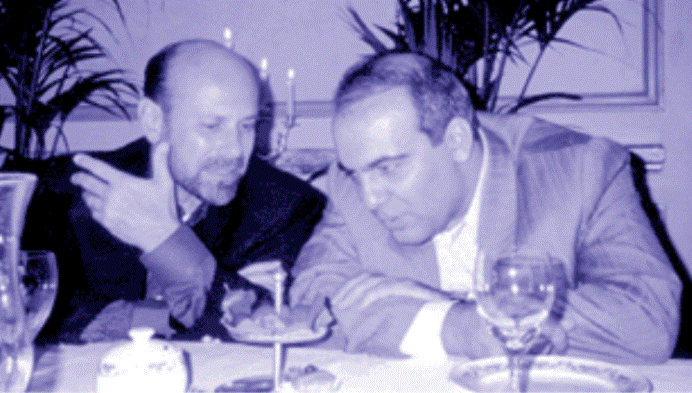Idealism, Cynicism, Realism: The Ups and Downs of Abbas Abdi

By: Ali Attaran
“Abbas Abdi's remarks hark back to an old grudge he has been harboring against Hashemi, whether it was during the Reform years when he attacked Hashemi or afterwards, when he always found excuses to target Hashemi Rafsanjani ... Abdi still uses castigation of Hashemi as a weapon.”
- Sadegh Zibakalam
Abbas Abdi made a name for himself in the November 1979 so-called “Conquest of the Espionage Den”, the takeover of the US embassy, the hostage crisis, in Tehran. Then, as a member of a loosely-bound group of Islamist students known as Followers of the Line of the Imam [Khomeini], Abdi stood at the left side of Iranian politics.
Abdi spent the 1980s initially in the Foreign Intelligence Bureau of the Prime Minister’s office before moving to the Bureau for Social Research in the General Prosecutor's office, then headed by fellow leftist cleric Mousavi Tabrizi. It was here that he developed an interest in social research and remained committed such afterwards.
In the late 1980s, Abbas Abdi became editor-in-chief of Salam, the mouthpiece for the Followers of the Imam, who, after the death of Imam Khomeini, were pushed to the margins of politics by powerful forces in the right, including Hashemi Rafsanjani. Salam's persistent criticism of then president Rafsanjani's neoliberal economic policies eventually led to Abbas Abdi's 11-month detention, before he was acquitted.
With Khatami’s presidency in 1997, Followers of the Imam reappeared on the political stage, now gradually morphing into liberals themselves --or 'revisionists' if one looked from the point of view of the establishment's hard core. Abdi was a high-profile figure of the reform front in the early years of Khatami's presidency, creating headlines and spearheading political and intellectual debates. In July 1998, while anticipations were high for rapprochement between Tehran and Washington, Abdi agreed to meet Barry Rosen, press officer in the US embassy during the 1979 takeover. The ‘exotic’ meeting, as Independent correspondent Robert Fisk called it, was seen as a fine example of the Reformists' revisionism in Iran. One hardliner weekly took the criticism to an entirely different level, bitterly quipping that while the American Barry Rosen wore a beard, Abdi was clean-shaven, apparently against the codes of conduct in Islamic shari’ah.
In the strident Sobh-e Emrooz, owned by Reformist mastermind Saeed Hajjarian, Abbas Abdi and Akbar Ganji directed their ruthless media campaigns against the Principlists, then known as the Right. Their attacks reached their peak in the winter of 1999 when Akbar Hashemi Rafsanjani decided to run for the sixth parliamentary election in order to play his favorite role of balance-maker against the increasing power of the Reform front. The ayatollah however did not make it to the parliament. Political and social pressures from the Reformist front forced him to resign before the parliament even inaugurated.
Despite their control over the government and the parliament, Reformists had failed to deliver their promises of political liberalization facing fierce resistance from real loci of power. The Twin Bills, submitted by Khatami’s administration to expand the authority of the president, were rejected by the Guardian Council, adding to frustration among the Reformists and their supporters. Against this background, Abbas Abdi put forward his controversial strategy of “withdrawal from the establishment”, the final push to convince the higher echelons of power to stop obstructing the reform process.
The man who had once climbed the walls of the US embassy to throw out ‘Yankees’ was arrested on the 24th anniversary of his stunt when a survey conducted by his Ayandeh research institute reported 74% support among the Iranians to negotiate with the United States. It could not be more ironic. The Reformists, defiantly calling for negotiations with the US, had raised the anger of Principlists by broadly covering the results of the report in their media a few days earlier. Even Supreme Leader Ayatollah Khamenei uncharacteristically referred to the story. “Another thing they do is showing the [Iranian] nation as intimated … if they fail to intimidate, they try to do it by raising ruckus and manufacturing surveys” he said on the anniversary of the embassy takeover.
Abdi’s second prison experience, thanks to a verdict by the Saeed Mortazavi, transpired to be much tougher than the first time. “After 30 years of struggle, I do not feel attached to the establishment that I fought for,” read a letter he published while in detention. His post-prison notes show a man who has come to terms with the reality of Iranian politics, frequently referring to the legal/real structure of power in the Islamic Republic. His analyses, mostly published in his weblog “Ayandeh” (Future), call not for molding the real structure in the favor of the legal, constitution-based structure, but for careful measures with an awareness of the true arrangement of power in the Islamic Republic. Abdi’s brand of dispassionate analysis became more evident in the 2009 presidential elections and the ensuing turmoil. Against the common trend of emotional rhetoric of the Reformists, he opted for reticence, and implicitly rejected claims of vote rigging in favor of Mahmoud Ahmadinejad.
From idealism to cynicism, Abdi seems to have retained one characteristic however and that is his criticism of Hashemi Rafsanjani. Last Monday, February 1, the Ayatollah made one of his strongest criticisms of the recent years when he directly chastised the Guardian Council for disqualifying Ayatollah Khomeini’s grandson from running for the upcoming Assembly of Experts elections. “Where have YOU brought your qualification from?” he asked the council. “Who has allowed you to judge?” he said, expressing sorrow that on the eve of the 1979 Revolution’s victory, the council has disrespected the household of Ayatollah Khomeini. Abdi’s response came as a surprise for many. “Reformists should not remain silent against such remarks or even worse, welcome them. Such statements are against Reformist principles.”

